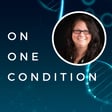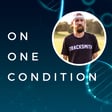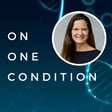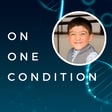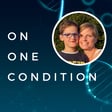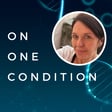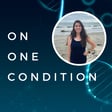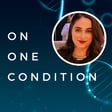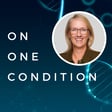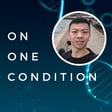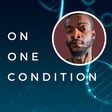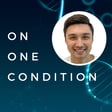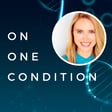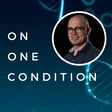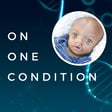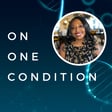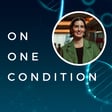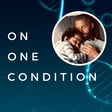Introduction to the Podcast and Guest
00:00:00
Speaker
Hi, I'm Sylvain Bertolo, and you're listening to On One Condition, a podcast to raise awareness about health conditions by listening to people who leave them every day. My guest today is Kayleigh Berkowski, and we're going to talk about Addison's disease.
00:00:16
Speaker
Hi, Kayleigh. How are you doing? I'm good. How are you? um Very well, thank you. We'll talk about Addison's Disease shortly. But before that, could you tell me which song you chose and why you chose that song?
00:00:32
Speaker
um I chose The Chain by Fleetwood Mac. Honestly, no particular reason other than it's just been on repeat past few weeks and has a really good beat.
00:00:43
Speaker
Okay. You don't necessarily have to have a reason, actually. I like that. So we're going to talk about Addison's disease. It's something that i know nothing about, although i've I've heard the name in the past, but I'm expecting to learn a lot today.
Kayleigh's Diagnosis Journey
00:01:00
Speaker
Starting with, how did you realize that you have Addison's disease? What was your diagnosis process? So I was diagnosed, I want to say back 2021, I had gone in to get diagnosed for postural orthostatic tachycardia syndrome or POTS.
00:01:18
Speaker
okay And the doctor did a lot of blood work. He's The doctor I saw was kind of like notorious for a lot of blood tests. Okay. And that ended up being kind of, it saved my life because a lot of people are diagnosed in hospital while actively in adrenal crisis, which I'll talk about more later.
00:01:39
Speaker
yeah But um they decided something seems off in my blood levels. And so they did further testing and here we are. is it unusual to do blood tests for POTS?
00:01:52
Speaker
For POTS, well, I guess it's somewhat to rule out other possibilities. So not totally unusual, but not like a way to diagnose POTS itself.
00:02:03
Speaker
And why were you consulted for POTS diagnosis? What were your symptoms at the time? I was having a lot of dizziness upon standing.
00:02:14
Speaker
i was having fainting episodes, stuff like that. How did you manage it? How long did it last and before you you actually got to the doctors? I got in pretty quick because I brought it up to my like general doctor and she recommended me to a doctor with children's in DC. And we were lucky enough to get in relatively fast.
00:02:38
Speaker
Yeah. So then you got the blood test results. What happened after that? Well, the original the initial blood test came back looking strange. They referred me to endocrinology. Endocrinology wanted more tests, so we did more tests, which were very early morning, no food, no whatever, NPO, and miserable.
00:03:07
Speaker
Yeah. Had to get those done and those came back basically confirming the diagnosis of Addison's disease. Okay. Because my cortisol and my ACTH were not within normal range.
Understanding Addison's Disease and Management
00:03:22
Speaker
and So tell us a bit more about Addison's disease then. What does it do to your body? So Addison's disease is where your adrenal glands don't, they don't do their job at all. Okay.
00:03:35
Speaker
They're called the adrenal glands because most, they make adrenaline. That's not my problem. My problem is with cortisol, where my body just doesn't make adequate amounts.
00:03:47
Speaker
And therefore, whenever I get sick, my body kind of freaks out. And I either have to stress dose with my medication Or if I don't catch it in time, I have to go to the hospital.
00:04:00
Speaker
to Define freaks out because yeah i don't I don't know what you mean by that. Not the most medical term. Basically, when my cortisol levels dip, which I believe it gets confused with Cushing's a lot.
00:04:17
Speaker
But Addison's is basically the opposite of Cushing's. And when my cortisol levels, when they dip, I get very nauseous. na Nausea is usually my first symptom.
00:04:28
Speaker
okay It is also the worst symptom because it is nearly impossible to stop. okay After that, um after the nausea, usually my body gets very shaky. That's another major symptom that just continues And i will I tend to get headaches with it, like the dull, throbbing headaches and muscle tightness.
00:04:53
Speaker
And my blood pressure, most people, it goes low. Mine goes high, which we still haven't fully figured out why it does that. And what do you do in those situations then? So I mentioned stress dosing. i Every day I take a medication called hydrocortisone.
00:05:10
Speaker
For stress dosing, I take 20 milligrams every few hours. And I have to do that for... It depends on what the illness is. i usually consult my doctor via like the portal.
00:05:23
Speaker
And usually it's a 24 to 48 hour cycle. And I have to keep that down. If I don't, then it's injection and hospital time. Okay.
00:05:35
Speaker
So hydrocortisol, you said you take it every day. Is that oral medicine? Yes, it's a oral. It's a pill. Okay.
00:05:47
Speaker
Which doesn't help when you have nausea, I imagine. No, because it is one of those medicines that if you do not swallow it the second you put it in your mouth, it's the worst taste imaginable. I don't know how to explain it. It's just straight chemicals.
00:06:05
Speaker
ever Wow. And so when you first got diagnosed, at that time, were you experiencing those symptoms? Is that all those symptoms that made you go for a diagnosis? Yeah.
00:06:19
Speaker
So as I mentioned, I went in for POTS, which I did end up getting diagnosed with in addition to the Addisons. But I was having the nausea, which is one of those. it's kind of a cross symptom.
00:06:30
Speaker
Kind of get it with both. And the dizziness can be with Addisons. It's kind of blurry. Okay, so you you have Addison's and Potts, which could, like, one of the dizziness could be associated with Potts as well. Is that right?
00:06:47
Speaker
Mm-hmm. Yeah. Okay. You talked about ah Dr. Portal. Can you tell me more about that? I've never heard of something like this. So a lot of patients, at least that I know in the US, use MyChart.
00:07:03
Speaker
Children's National Hospital does not do MyChart. They have their own portal. And basically in there, you can see your blood test results. You can kind of email your providers okay if you don't need to get in contact with them as urgently.
00:07:19
Speaker
Though usually they're very good at responding quickly. It's a form of communication. It's where all your records go, all your notes, everything. That's good. And are they responsive enough?
00:07:31
Speaker
Because you said that you need to dose every six hours when you stress dose. So they get back to you within those within a few hours, within a few minutes?
00:07:42
Speaker
Really? Wow, that's amazing. That's progress in itself compared to a few years back. So that's good.
Treatment and Seasonal Challenges
00:07:50
Speaker
How long did it take then, the process of of diagnosis?
00:07:54
Speaker
Did that lead to yeah being prescribed hydrocortisone straight away, or did it take some time? It's kind of blurry. It's been a few years, but I would say it was pretty quick because it's not something that you should really skip medication for. So they were like, let's get you on this because we think you have it. And then they kind of confirmed the diagnosis.
00:08:19
Speaker
And did you have like a dosing period where you had to find the the right dose for you? There were a few days where I had to take it like I was stress dosing. It was the first few days and my parents would wake me up in the middle of the night.
00:08:35
Speaker
And it took a little bit to find the right dose, but it was pretty quick. and Okay. Well, that's good. So you mentioned illnesses. Is your body more susceptible to illnesses?
00:08:48
Speaker
with Yes, because of the hydrocortisone. It makes my ah body immunocompromised. so okay So it's kind of a vicious circle. Yep.
00:08:59
Speaker
yeah Do you do anything to avoid getting ill? I do a few things. My major one, which honestly might be placebo, but it seems to work, so I'm just gonna stick with it. I take the little, I don't know if you have these, the emergency packets that you pour into, like, water and you just drink it. It's it's like a thousand milligrams of vitamin C.
00:09:23
Speaker
Okay. I don't really know if it works, but it tastes decent. So and then my other thing, I use a lot of hand sanitizer, especially because of my job. Like I work with kids.
00:09:36
Speaker
Yeah. Like school age children. So yeah. Yeah. Yeah, they're not the best crowd if you want to avoid and getting ill, unfortunately.
00:09:47
Speaker
Yep. Yeah. So you can get ill quite easily. Is that something that happens to you regularly? Do you end up in the hospital ah frequently or not?
00:10:00
Speaker
It's usually in the winter. Ending up in the hospital is like once or twice. And it's always in the winter. Okay. I've never been hospitalized any other season. Yeah.
00:10:11
Speaker
I just get really sick during the winter, which is when everything is kind of going around. so What do those hospital visits look like?
00:10:22
Speaker
Well, usually it starts with, depending on the hospital, sitting in the waiting room for hours upon end, which they've gotten better at because I'm not supposed to be sitting on in the waiting room because if I'm throwing up my medication, that's an urgent thing.
00:10:38
Speaker
There's actually a closer hospital than Children's, which we usually go to first, and then they might transfer me if need be. They get me in usually like within 15 minutes of me walking in.
00:10:49
Speaker
Because they they don't know my diagnosis very well, but what they do know is they need to get me back and they need to start treatment. and Okay. But basically, i i stay there for few days, usually no more than a week.
00:11:04
Speaker
A lot of IV hydrocortisone, lot of IV fluids. If it's treatable with an antibiotic, they might put me on an antibiotic. Usually, it's kind of waiting it out.
00:11:17
Speaker
So I can imagine that it doesn't help with being a student because i if I'm not wrong, you're you're still studying.
Managing Education and Health
00:11:26
Speaker
Yes. Yeah. How do you balance being chronically ill with studying?
00:11:33
Speaker
First of all, Google Calendar is my best friend. Love Google Calendar because it sends me reminders. But otherwise, so I am homeschooled for the most part, which definitely helps.
00:11:45
Speaker
Oh, yeah Okay. But I am also dual enrolled at University of Alabama, which is a different time zone. So usually if I'm in the hospital, i tend to send an email.
00:11:58
Speaker
I just joined University of Alabama, but I was with Regent University in the spring. And I would just email if I was in the hospital. And my professors would usually just be like, get it in whenever. Okay.
00:12:13
Speaker
Are you homeschooled because of Addison's? So when COVID happened, I had to finish out sixth grade virtually, which I hated.
00:12:25
Speaker
ah So when we found out that it's very, very likely that the next school year would be virtual, my mom was like, okay, let's try homeschooling. Because we had been considering it because I got bullied a lot in public school.
00:12:39
Speaker
And that we kind of just bit the bullet. And I loved it. worked really well for me. So we just haven't really wanted to go back to public school.
00:12:50
Speaker
Yeah. Is the bullying linked with your symptoms at all? No, because this was but the bullying was before my diagnosis.
00:13:01
Speaker
Yeah. So you mentioned pediatrics, so you're still followed by pediatric hospital. Yes, I am. Yeah. What's your lookout on adulthood? Is this something that you think about being chronically ill? Do you have any questions that that you have no answers to at the moment?
00:13:27
Speaker
Well, I am able to be with Children's National until I'm 26, or I think. I think it's 26. It might 22,
00:13:38
Speaker
But either way, I do know that through college, I'll be able to keep with my current care team, which is nice. However, adulthood is kind of scary to look out on because probably don't plan to stay in Maryland. I don't.
00:13:55
Speaker
There's nothing here other than family. And I love my family, but this just isn't the right place for me. Okay. and So it's more, it's not necessarily about adulthood, but it's about the prospect of having to leave home.
Transitioning Healthcare and Stress Management
00:14:14
Speaker
How do you think you will manage by yourself if you need to receive treatment and so on?
00:14:23
Speaker
what What's your plan? Do you know how you you'll manage that? So I don't know the specific like legalities of it, but I do plan to... i don't I think it's like some sort of forms that you signed to have your ah medical information released to certain people. I plan to get that done so that my parents, like if I'm in the hospital as an adult, they can still get information on me.
00:14:49
Speaker
That's something we're planning on. But otherwise, it's a little scary to look out on. yeah Do you know if there's any transition process in a way between pediatric, like moving from your current healthcare team to a new team essentially, even if it's not the transition into adulthood, if you're moving states, then I imagine that there's a lot that a lot of of information you need to share with a new healthcare team.
00:15:23
Speaker
Well, luckily, because of the portal, that's where all my documents are. So yeah I have all the documents, but we haven't talked about what will happen when I age out of the pediatric hospital. We haven't talked about that yet.
00:15:36
Speaker
When I go to college, I will probably moving states. I don't have a single college that I'm looking at in my state. yeah Closest I'm looking is in D.C., But otherwise, all of my schools are kind of Northeast and the Midwest.
00:15:53
Speaker
Yeah. And a lot of that also includes changing time zones. That'll be interesting because I don't know how my body will react to that. But when I'm looking at colleges that I'm interested in, every single one, I have a spreadsheet.
00:16:07
Speaker
Every single one, I have the closest hospital and how close it is. And then I have the top endocrinology hospital within 50 miles. And if there isn't one, then I have to call one of their hospitals nearby and be like, hey, do you know what Addison's disease is?
00:16:26
Speaker
or should I just cross the school off my list? Wow. Yeah. Yeah. Yeah. That's a lot to think about. Usually people will go, okay, if I'm at this university, where will my apartment be? And that's the extent of it. But you you need to plan much more.
00:16:48
Speaker
Yeah, well, it's good. you You made a good point about the portal. I'm glad you mentioned it because it makes transferring patient information so much easier. And I imagine that then other hospitals will be able to see your your history as well.
00:17:05
Speaker
I would assume so, but also because Children's doesn't use MyChart, it might be a slightly rougher transition, but I'm sure there's a way to transfer it over.
00:17:16
Speaker
Yeah. yeah And when you go to the hospital, is it a situation where you can advocate for yourself or do you need someone with you to explain what the the usual protocol is?
00:17:30
Speaker
Well, at the moment, I'm a minor, so usually my mom's with me. But I won't. I'll be 18 at the end of January, which is really, really weird to think about. But even then, i I imagine she'll probably be with me. Yeah. At least through my senior year. Mm-hmm.
00:17:48
Speaker
And is there anything else that impact your body? Because you mentioned getting ill, but are things like stress or anything else ah impacting your your condition?
00:18:03
Speaker
Stress is a big one It's the second thing that I have to stress dose for every so often. I've been relatively good at managing my stress levels to the point where I usually don't have to stress dose for really important things that are going on.
00:18:21
Speaker
But at the beginning of my diagnosis, that was something that I had that i needed to stay on top of. How do you manage to not be overly stressed ahead of exams, for example?
00:18:34
Speaker
What do you do? because I'm homeschooled, I don't have to do the state testing, which helps. I always had a ton of anxiety over state testing. I've actually been diagnosed with generalized anxiety disorder since I was like eight.
00:18:48
Speaker
But... Overall, because of being in homeschool, I don't need to worry nearly as much about tests and exams. And if I do, it's through dual enrollment.
00:18:59
Speaker
And I have like, most of the time it tends to be open book or there's a few retakes on the test, stuff like that. Okay. Yeah. Good. its It sounds like you have like a right setup for you. It's it's very good because the school system can be unforgiving in a way because you have to fit Oh, very much so. Yeah. Yes.
00:19:24
Speaker
Yeah, that's good.
Pursuing Musical Theater with Chronic Illness
00:19:26
Speaker
What do you want to do? What are you studying for? So my plan is to get some sort of degree in musical theater, which not the most conventional career path, but I can't really imagine myself doing anything else.
00:19:42
Speaker
And college is expensive. So I don't want to waste money on a degree that I just can't see a career path in. yeah i also want to get a minor in marketing so that I can have...
00:19:55
Speaker
You know, something something just in case something like COVID happens again. Yeah. Where Broadway was broadway was dark. there were there weren't There wasn't anything going on. No. And so actors had to find other jobs. And that's i that's why the marketing minor.
00:20:12
Speaker
It's a big part of me deciding like what schools I will apply to. Yeah. Most of the schools, except for like one are that i have on my list are um universities and they would allow me to have a minor. and Okay.
00:20:29
Speaker
So, yeah. Nice. It's good that you have a you seem to have a good goal. So that's unusual, I would say, for someone your age. But with that in mind, actually, and you just talked about stress, do you not worry that going on stage and and stress could lead to dip in your ah cortisol level?
00:20:55
Speaker
So i've been I've been performing for... gosh, years now. I don't really know how many. But so I have a lot of experience on the stage and performing and being through tech week, which is also referred to as hell week for many reasons, yeah but particularly because you're there for long hours running the show multiple times underneath hot stage lights in heavy costumes.
00:21:23
Speaker
So that's not the worry for me. i would say The worry for me would be going to a degree program that wouldn't be willing to work with me.
00:21:36
Speaker
Okay. So something that you wouldn't find food fulfilling or that wouldn't be flexible enough to adapt to your condition. Is that what you mean? and So i'm I'm also hypermobile. That's the other thing.
00:21:49
Speaker
That's my bigger problem when it comes to theater. So what I really, really look for is, oh, does this school have somebody who's knowledgeable in dancers with hypermobility? Because musical theater is singing, dancing, and acting.
00:22:05
Speaker
Yeah. And so you have to be cross-trained. Wow. And are people open to those discussions? Yeah. ie say I would say yes. I don't think I would apply to a school that wasn't. Yeah, yeah.
00:22:24
Speaker
All of the ones on my list that I've talked to have been wonderful and very open, and I'm very grateful for that. Do you have to mention Addison's disease when you apply for a school?
00:22:38
Speaker
You don't have to, but I wrote my college essay about it, so okay I kind of chose to. yeah Yeah. Why did you choose that as your college essay? It was, so I was struggling with my college essay for months. I was like, I have no clue what to write about. I don't even have a hook.
00:22:57
Speaker
Yeah. Which the hook is like the big starting point for most people. Yeah. And one day i was like, I wonder how much it would cost for my medication for the average lifetime without insurance.
00:23:11
Speaker
So of course I decided to calculate that and that is how my essay hook came to be. Interesting. Sometimes the answer is just in front of you, right?
00:23:23
Speaker
Actually, why do you want to raise awareness about Addison's disease? A lot of the patient advocates I talk to are older than you.
00:23:34
Speaker
Why now? Because i i think I would be doing myself a disservice to just go about my career plans, ignoring it, because it is a part of me. it is something that is not going to go away.
00:23:49
Speaker
i have the primary form of adrenal insufficiency. There's no recorded cases of it healing. So I know that I have to adapt. I've been adapting. So why would I not?
00:24:01
Speaker
Why would I not raise awareness? Because there's it's not something you see representation for. I haven't found a single book, a single movie, a single play, anything where a character has something similar.
00:24:14
Speaker
I've tried. So if you don't have a character that, let's say, kids with this disease could look up to, then there should at least be somebody, like a person.
00:24:28
Speaker
Yeah, yeah Yeah, you're right. You need... to but It's not necessarily a role model, but you need someone you can relate to. Yes. Yeah. Is that something you'd like to to
Raising Awareness in Theater and Personal Life
00:24:41
Speaker
see then? you Would you like to have an impact on the music theater industry to have more characters that represent chronic illnesses?
00:24:54
Speaker
Yeah, that would be that would be really cool. Or even just, there are so many characters within musical theater that Easily, like, you know, I don't know if you've heard people talk about how, oh, this character is autism coded or ADHD coded or something like that.
00:25:12
Speaker
They're written in a way that they might have autism or they might have ADHD. There's so many characters where i think personally that could work with chronic illness as well.
00:25:24
Speaker
Yeah. Yeah, yeah. You're right. fully agree. Well, that's ah another goal then. Kind of. Yeah. How about friendships?
00:25:36
Speaker
Does it have any impact on making friends or keeping friends? I have a I'd like to say that I have a really strong friend group.
00:25:49
Speaker
I have a few friends that I've known since public school. One of my best friends, I've known her since second or first grade. She's stuck with me through all of it.
00:26:01
Speaker
But most of my friends, I haven't, if I've lost any friends, it hasn't been due to this. Okay. For the most part. there's been There was like one friend where rumors were spread and That just wasn't something that i knew would be something to keep in my life, something to put my energy into.
00:26:23
Speaker
and So I didn't. But through theater a lot, I've made some incredible friends. And that is part of why I love this industry.
00:26:35
Speaker
it It's very accepting for the most part. And there's a space for everybody. Mm-hmm. This industry is probably even more accepting than others, actually.
00:26:47
Speaker
For the most part, because there's always going to be a few people. yeah There's always going to be a few bad apples. Yeah, yeah. And do you think there's more awareness of chronic illnesses, there's better acceptance of chronic illnesses than, I don't know, maybe five to eight years ago?
00:27:11
Speaker
I would say say yes, but it's also it's also kind of hard because five to eight years ago, I was 13 to 10. So yeah little hard to say, but I would yeah but i would assume so.
00:27:28
Speaker
Yeah. With the way our society just has been developing. Yes. Yeah. Well, I have one last question for you.
Conclusion and Reflections
00:27:37
Speaker
What's your happy place? A place where you feel at peace?
00:27:41
Speaker
it It might seem a little obvious. There's two. I love my room, my bedroom, my own personal space. It's wonderful.
00:27:53
Speaker
It's messy right now. I need to clean it. But it's comfortable. It's it's made for me. I'm the one who curated it. There's books everywhere.
00:28:04
Speaker
um and it's calm and it's quiet. But my other space, when I don't, when I'm not feeling, what's the word? Antisocial.
00:28:16
Speaker
Is on stage because even though the the lights are bright and they're hot, there's just nothing for me that compares to the feeling of being on a stage, being mic'd up and just pouring out my emotions for an audience that wants to receive it.
00:28:36
Speaker
oh That's very, very nicely said. Thank you. And i was i was kind of expecting it, but I didn't want to make assumptions.
00:28:47
Speaker
But yeah yeah, I think you described it so well. It's so nice. you well Kayleigh it's been so nice talking to you learning about Addison's disease and and I'm really glad that you're raising awareness and and i yeah I agree with you that there should be more representation for for children to to see people who may struggle in life in the same way as they do.
00:29:19
Speaker
People who are while similar to what they're experiencing. Yeah. Thank you for this opportunity. Well, thank you. And good luck for the future. Thank you so much.

